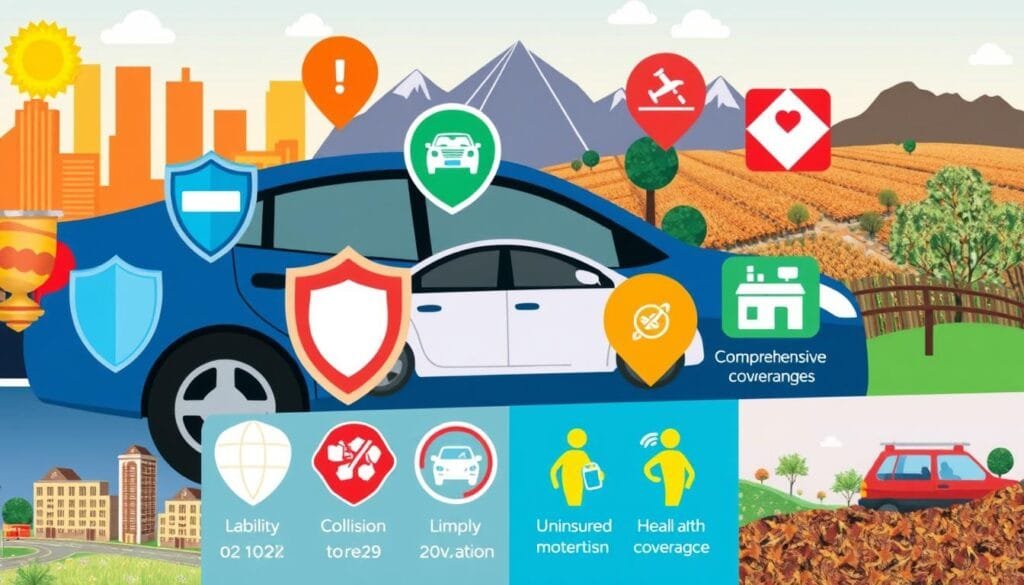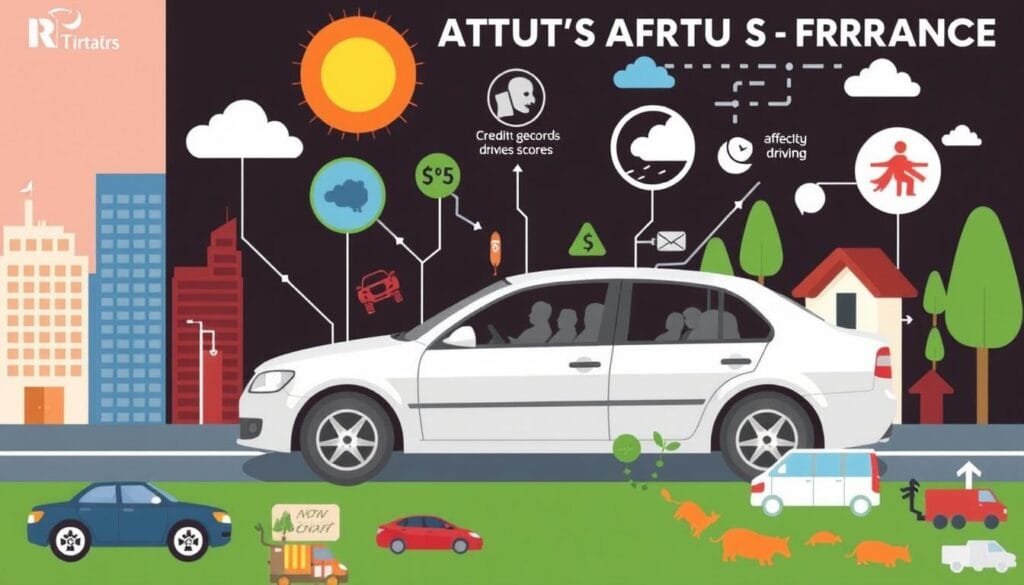בעולם של היום, ביטוח רכב הוא חיוני. זה מבטיח שהרכב והכספים שלך בטוחים. תאונות, גניבות ואירועים בלתי צפויים עשויים לקרות בכל עת. עם הביטוח הנכון, אתה מכוסה.
סוג זה של פוליסה הולך מעבר לתיקון רכבים בלבד. זה מסך פיננסי נגד חשבונות גדולים, מתיקונים עד דמי ריפוי. לדעת על ביטוח רכב היא מרכזית להיות נבון פיננסית. זה נותן לך שקט נפשי, ואתה יודע שהרכב והכסף שלך מאובטחים.
מסקנות מרכזיות
- ביטוח רכב משמש ככלי חובה משפטית ורשת ביטחון פיננסי.
- הגנה נגד גניבות, תאונות ואחריות היא יסודית.
- הכיסוי יכול לכלול עלויות תיקונים, הוצאות רפואיות ודמי משפט.
- הבנת יתרונות ביטוח שונים משפרת ביטחון פיננסי.
- לאבטח ביטוח רכב הוא חיוני לכל בעל רכב.
הבנת מושגים בסיסיים של ביטוח רכב
ביטוח רכב חשוב לבעלי רכב. זה מספק ביטחון פיננסי לאירועים כמו תאונות וגניבות. לדעת על ביטוח
יסודות ביטוח הם יותר מהבנת מהו ביטוח רכב. זה כרוך בלמידת מונחים והגדרות עיקריים שצורפים לכיסוי שלך.
כמו כן, ידע על ביטוח רכב חיוני להבנת הדרישות המשפטיות. במקומות רבים דרוש לך לקבל סכום מסוים של כיסוי כדי לנהוג באופן חוקי. אתה משלם פרמיום לביטוחן כדי לכסות סיכונים.
מהו ביטוח רכב?
ביטוח רכב הוא הסכם בינך לבין חברת ביטוח. הוא מכסה הפסדים כלכליים מתאונות או נזקים. הבנת זאת עוזרת לך לנווט במדיניות הביטוח בצורה יותר טובה.
מונחים עיקריים במדיניות ביטוח רכב
למידת מונחי ביטוח רכב עוזרת לך להבין את מדיניות הביטוח שלך. להלן סיכום של מונחים חשובים:
| מונח | הגדרה |
|---|---|
| פרמיום | הסכום ששולם עבור כיסוי ביטוח, בדרך כלל בקצב חודשי או שנתי. |
| השתתפות עצמית | ההוצאה הכספית שיש לשלם לפני שחברת הביטוח מתחילה לכסות את שאר עלויות הטיפול. |
| מגבלת פוליסה | הסכום המרבי שחברת הביטוח תשלם עבור טענה או אובדן מקורה. |
למידת שפת הביטוח מפתחת לביצוע בחירות חכמות. היכרות עם מונחים אלה עוזרת לך לעיין באפשרויות שלך. עם הידע הזה, תוכל לבחור תוכנית ביטוח שמתאימה לצרכיך.
סוגי כיסוי ביטוח רכב
הבנת סוגי שוני כיסוי ביטוח רכב מפתחת לנהגים להגן על עצמם ועל רכביהם. אפשרויות שונות עונות על צרכים שונים. בואו נגלה את סוגי הכיסוי העיקריים של ביטוח רכב.
כיסוי אחריות
כיסוי אחריות הוא חלק מרכזי בביטוח רכב. הוא מכסה טענות מצד אחרים על נזק פסגות או נזק רכוש אם בעל הפוליסה אשם. רוב המדינות מחייבות אותו כדי לוודא שהנפגעים מקבלים פיצוי. זה נותן לנהגים שקט נפש, והם יודעים שהם מכוסים במקרה של תאונה.
כיסוי התנגשות
כיסוי התנגשות משלם עבור תיקונים לרכב שלך לאחר תאונה, ללא קשר לאשמתו של מי. זה חיוני להגנת ההשקעה שלך ברכב. זה עושה את תיקוני התנגשות ניהלים יותר, כך שתוכל לנהוג בביטחון, ולדעת שאתה מוגן כלכלית.
כיסוי מקיף
כיסוי מקיף מציע הגנה נגד נזקים שאינם תוצאה של תאונה. זה כולל גניבות, נזקי ונדל״ן, אסונות טבע ועוד. זהו רשת ביטחון להפסדים פיננסיים בלתי צפויים. כיסוי מקיף הוא חשוב מאוד, מגן נגד אירועים שעשויים לפגוע ברכב שלך.

ביטוח רכב: כיסוי והטבות
כל נהג צריך להבין את היתרונות של ביטוח רכב. זה נותן לך שקט נפשי וביטחון פיננסי. בעת בחירת פוליסה, היתרונות של ביטוח רכב עשויים לשפר באופן משמעותי את החוויה שלך.
הגנה פיננסית עבורך ועבור הרכב שלך
ביטוח רכב הוא מרכזי לכיסוי עלויות בלתי צפויות מתאונות, גניבות או אסונות. זה עוזר לשלם על תיקונים, עלויות רפואיות ותביעות משפטיות. זה מפחית את הלחץ הפיננסי עבור נהגים, ומדגיש את ה
חשיבות הכיסוי שכל בעל רכב צריך לשקול.
דרישות משפטיות והתאמה
חוקי ביטוח רכב משתנים ממדינה למדינה, ומציבים רמות מינימליות של כיסוי. הציות לחוקים אלו עוזרת למנוע קנסות או אובדן רישיון. הכרת חוקי המדינה שלך עוזרת לך להישאר מכוסה ולהגן על אחרים בדרכים.
יתרונות נוספים לשקול
ספקי ביטוח מציעים גם יתרונות נוספים בביטוח רכב כמו עזרה בכביש, כיסוי להשכרת רכב ועוד. התוספות הללו מספקות יותר הגנה לצרכים הייחודיים שלך. חשיבה על אלו יכולה לשפר את תוכנית הביטוח שלך, ולהעניק לך כיסוי מותאם אישית.

גורמים המשפיעים על דמי הביטוח לרכב שלך
נהגים שמחפשים את המחירים הטובים ביותר צריכים להבין איך דמי ביטוח הרכב עובדים. גורמים רבים תורמים לקביעת עלות הכיסוי. הכרת אלו יכולה לעזור לך לחסוך כסף. הנה כמה רכיבים מרכזיים שמשפיעים על עלויות הביטוח שלך:
היסטוריית נהיגה וציון אשראי
היסטוריית הנהיגה שלך היא נושא חשוב לחברות ביטוח. אם יש לך רשומה נקיה, בלי תאונות או דוחות, סיכוייך לקבל תעריפים טובים יותר גבוהים. היסטוריית נהיגה חשובה מאוד. מאידך, דברים כמו דריכה מהירה או תאונות בהן אתה אשם עשויים לגרום לעליית התעריף שלך. הציון האשראי שלך גם חשוב. ציון אשראי גבוה יכול להוביל לעליית עלויות הביטוח. חברות הביטוח חושבות שאנשים עם ציון אשראי טוב הם פחות סוכנים.
סוג הרכב ושימוש
הסוג של הרכב שאתה נוהג משפיע על מחיר הביטוח שלך. נהיגה ברכב יוקרתי או רכב ביצועים גבוהים עשויה להביא לתשלום יותר גבוה. זה בגלל שהרכבים הללו עולים יותר לתיקון ונגנבים יותר בתדירות. גם איך אתה משתמש ברכב שלך חשוב. שימוש ברכב לעבודה, לכיף, או פשוט לנסיעה משנה את התעריפים שלך. נסיעה יותר נוגעת בדרך כלל בתשלום יותר עבור הביטוח.
מיקום גיאוגרפי
המקום בו אתה גר משפיע הרבה על התעריפים המקומיים לביטוח שלך. כל אזור מציב את האתגרים שלו כמו רמות תאונות וגניבות. ערים גדולות נוטות לכלול עלויות ביטוח גבוהות יותר בגלל תנועה ותאונות רבות יותר. אבל, אם אתה גר במקום רורלי, ייתכן ותשלם פחות בגלל כבישים פחות עמוסים. ההבדלים הללו נבעים מה
השפעת המיקום והחוקים של כל תקנות ביטוח המדינה.

| גורם | השפעה על הפרמיום |
|---|---|
| היסטוריית נהיגה | רשומות נקיות מורידות את התעריף; הפרות מעלים את התעריף |
| ציון אשראי | ציונים גבוהים מובילים לתעריפים נמוכים יותר |
| סוג הרכב | רכבי יוקרה/ביצועים גבוהים מעלים עלויות |
| שימוש | מרחק נסיעה גבוה בדרך כלל מוביל לתעריפים גבוהים יותר |
| מיקום | אזורים עירוניים כוללים תעריפים גבוהים יותר בדרך כלל |
איך לבחור את מדיניות הביטוח לרכב הנכונה
בחירת ביטוח רכב דורשת חשיבה זהירה על מספר נקודות מרכזיות. התחל עם הערכת צרכי הכיסוי כדי לראות מה שאתה צריך. חשוב לחשוב על איך אתה נוהג, על התקציב שלך, ועל מה שאינך יכול לסכן לאבד. לדעת כמה כיסוי אתה זקוק לו יכול לחסוך כסף ולשמור על בטיחותך.
הערכת צרכי הכיסוי שלך
כאשר אתה מחליט על כיסוי, חשוב לחשוב על הנקודות הבאות:
- ערך הרכב שלך
- היסטוריית הנהיגה שלך
- חשיפת אחריות פוטנציאלית
זה עוזר לבחור ביטוח שמתאים בדיוק.
השוואת חברות ביטוח שונות
חשוב להשוות בין חברות ביטוח שונות. אסוף הצעות ממספר חברות ביטוח. לאחר מכן, תקפיד על:
- דירוגי שירות לקוחות
- תהליך טיפול בתביעות
- הנחות זמינות
- מגוון אפשרויות כיסוי
מסקנה
כאשר מדובר בבעלות על רכב, חשוב לדעת על ביטוח רכב. הסקירה הזו מראה על חשיבות הכיסוי הנכון. זה נחוץ מבחינה משפטית ופועל כרשת בטיחות לאירועים בלתי צפויים. סוגי כיסוי שונים מאפשרים לצרכנים לבחור מה שעובד עבורם.
העלות של הביטוח שלך עשויה להשתנות בהתאם לדברים כמו המקום בו אתה גר וההיסטוריית הנהיגה שלך. הבנת אלו יכולה לעזור לך בשיחה על תעריפים. ביטוח רכב הוא מרכזי להגנה על הרכוש שלך ולשמירה על נפשך בזמן הנסיעה.
חשוב לחשוב על איך ביטוח הרכב הנכון יכול לכסות אותך כלכלית ולאפשר לך לנסוע בלי פחד. בחירת הביטוח הטוב ביותר דורשת הבנה של צרכיך והשוואה בין חברות ביטוח שונות. בכך תטפל בביטוח רכב בצורה יותר טובה ותקבל החלטות חכמות עבורך.






















